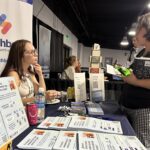The inaugural Refugee Resettlement Research Symposium took place from August 22–24, 2023. From three days of rich discussion, attendees gained perspectives from across sectors, examined policies and programs, and emerged with a renewed commitment to collaboration. Bringing together practitioners, researchers, community members, and government staff, the event was a space to reimagine and revitalize resettlement services across the country. The symposium was funded by the Office of Refugee Resettlement (ORR) and co-hosted by Switchboard and Arizona State University.
Why Hold a Research Symposium?
When the Taliban took power in Afghanistan in 2021, the United States’ evacuation of Afghan allies initiated a very challenging period for the U.S. refugee resettlement system. The Research Symposium took place in the wake of Operation Allies Welcome and was conceived as a time to pause and reflect after a period of upheaval.
The event was held at Arizona State University (ASU) Thunderbird School of Global Management. Over the course of a three-day symposium, leaders in resettlement research, policy, and practice met to recognize pressing challenges stemming from the Afghan evacuation, the pandemic, and past administrative decisions, and to reimagine modern-day resettlement based on research insights.
New ideas and knowledge gained from the symposium will inform Switchboard’s training and technical assistance (TTA) going forward. In addition, those requesting technical assistance (TA) from Switchboard will now be able to request evidence summaries and support with research projects, among many other helpful resources.
Who Participated?
Three key groups of participants joined the symposium:
- Academic participants included researchers from American University; Arizona State University; Boise State University; Boston College; Brigham Young University; George Mason University; Harvard University; Loma Linda University; Missouri State University; Northeastern University; Oakland University; Ohio State University; Stanford University; University of Albany; University of Central Florida; University of Connecticut; University of Dundee; University of Lisbon; University of Michigan, Ann Arbor; University of Oxford; University of San Francisco; University of Utah; University of Vermont; and York University.
- Among the non-academic speakers, we heard from the Urban Institute, the Migration Policy Institute, Lutheran Social Services of the National Capital Area, the International Rescue Committee (IRC), the Tennessee Office for Refugees, and Mwangaza Wa Upendo, together with many others.
- Colleagues from the federal government included ORR Director Robin Dunn Marcos; ORR Refugee Program Director Ken Tota; U.S. Department of State, Bureau of Population, Refugees, and Migration (PRM) Deputy Director Kelly Gauger; and PRM Section Chief for Domestic Resettlement Holly Herrera. State government officials included Arizona State Refugee Coordinator Charles Shipman and others.
Four Symposium Highlights
Participants shared many takeaways from the event, including the following:
- It is essential to embed client voice and lived experience into research, program development, and policy. Researchers, practitioners, and policymakers share a commitment to ensuring client voice is a central component of their work.
- The resettlement community needs more opportunities to bridge gaps across sectors. Participants were interested in more opportunities for engagement and dialogue between practitioners, government leaders, researchers, and academics to foster an environment of open conversation and collaboration.
- We can work collectively to demystify the research process and challenge misconceptions about research, including the idea that researchers are just there to answer questions. Researchers and practitioners realized they spoke a very similar language and were interested in analogous projects.
- No one has a complete vision or definitive answer on the challenges of resettlement or how to resolve them. Everyone brings their narratives, experiences, and assumptions. The symposium enabled recognition of what many different perspectives have to offer, along with their limitations. Participants emerged with a renewed commitment to collaboration.
Spotlight on Sessions
-
- “Innovation in Refugee Health and Well-being” shared research and reflections on promoting health and well-being for refugee women, mental health frameworks, health care access, and trauma recovery.
- “Preserving Protection in the Wake of Upheaval” discussed asylum and resettlement policies and new humanitarian parole processes for Cuban and Haitian arrivals, and it compared concepts like refugee, asylum-seeker, and parolee status.
- “Digital Possibilities and Refugee Resettlement” explored technology’s role in refugee services.
- “Building the Evidence Base: What Works?” examined effective programs and evidence-based interventions.
- “Scaling Protection to Meet Increased Need” discussed capacity to assist larger numbers of newcomers.
- “Recalibrating the Public-Private Partnership” explored the role of community sponsorship programs and public-private partnerships, examining their impact on integration and their sustainability.
- “Aligning Education, Experience, and Employment” focused on educational credential evaluation, career pathways, employment outcomes, and mentorship programs.
- “Leveraging Participation to Improve Resettlement Outcomes” offered insights on participatory modalities, international comparisons of resettlement practices, and the use of photovoice methodology to empower refugee children in U.S. schools, with a focus on enhancing service delivery, sharing best practices, and amplifying refugee voices.
- “Higher Education Institution Support for Refugees: What’s Next?” focused on the increased engagement of higher education institutions in refugee resettlement efforts, including hosting Afghan students and scholars, forming partnerships with resettlement agencies, offering scholarships, and exploring the potential for campuses to serve as resettlement spaces, along with addressing the challenges and solutions encountered in this process.
Want to Learn More about Resettlement Research and Evidence?
It can be difficult to know about the state of research and evidence related to refugee programs and services. To help, Switchboard produces evidence summaries, which are short learning resources that consolidate literature related to particular outcomes or interventions. Learn three ways that evidence summaries can transform resettlement work, and find Switchboard’s evidences summaries here. In addition, Switchboard’s database of research studies can be found here.
Switchboard also produces original research studies and literature reviews, including:
- Understanding Afghan Families’ Needs and Strengths During Resettlement (ongoing, in partnership with Boston College and University of Illinois Chicago)
- Compassion Satisfaction, Burnout, and Secondary Traumatic Stress among Refugee Resettlement Workers in the United States (ongoing)
- Implementation Research in Refugee Resettlement: A Rapid Scoping Review (2023)
- Role of Digital Skills in Refugee Integration: A State-Of-The-Art Review (2022)
- Cultural Competence in Refugee Service Settings: A Scoping Review (2021)









